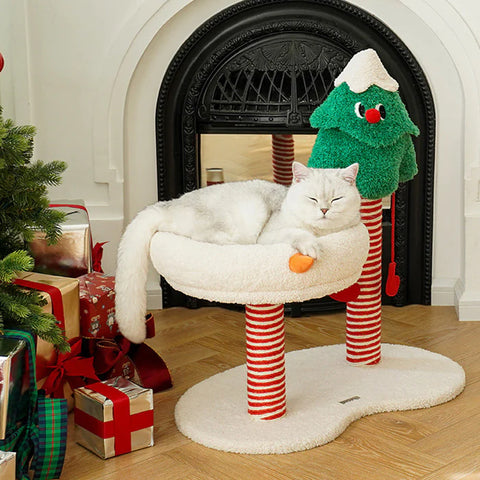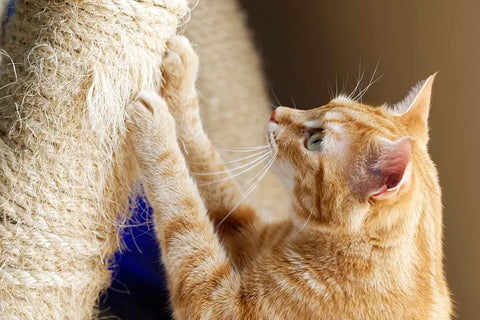Cleaning a cat tree is a crucial aspect of responsible pet ownership. Not only does it ensure your feline friend's health and happiness, but it also helps maintain the longevity of the cat tree itself. In this comprehensive guide, we will walk you through the essential steps and tips on how to clean a cat tree effectively. Say goodbye to pet odors, dirt, and allergens, and keep your cat's favorite hangout spot fresh and inviting.
Why Clean Your Cat Tree Regularly
Before delving into the cleaning process, let's first understand why regular cat tree cleaning is so important. Cat trees are more than just pieces of furniture; they serve as multi-functional play areas and resting spots for your beloved pet. Here's why you should make cleaning them a priority:
1. Hygiene and Health
Cats are meticulous groomers, and they deserve a clean and healthy environment. A dirty cat tree can harbor bacteria, dust mites, and allergens that could affect your cat's well-being.
2. Odor Control
Over time, cat trees can develop unpleasant odors due to urine, fur, and spilled food. Regular cleaning helps eliminate these odors, making your home more pleasant for both you and your cat.
3. Prolonged Lifespan
Cat trees are an investment, and proper maintenance can extend their lifespan. Regular cleaning prevents the buildup of grime and prevents structural damage.
Now that we understand the importance of cleaning your cat tree let's move on to the practical steps to keep it spotless.
Materials You'll Need
Before we start the cleaning process, gather the following materials:
- Vacuum Cleaner: A vacuum with a brush attachment will help remove loose fur and debris.
- Lint Roller: Perfect for picking up stubborn cat hair.
- Mild Detergent: Use a gentle, pet-safe detergent.
- Soft Cloth or Sponge: Ideal for wiping down surfaces.
- Rubbing Alcohol: Effective for disinfecting and removing tough stains.
- Disposable Gloves: Protect your hands from dirt and germs.
- Bristle Brush: Great for fluffing up carpeted surfaces.
-
Spray Bottle: Fill it with a mixture of water and vinegar for a natural cleaning solution.

Step-by-Step Cleaning Guide
Follow these steps to ensure a thorough cat tree cleaning:
1. Preparation
Begin by clearing the area around the cat tree. Remove any toys, cushions, or accessories. This will give you better access to all the nooks and crannies of the cat tree.
2. Vacuuming
Using your vacuum cleaner with the brush attachment, carefully vacuum all surfaces of the cat tree. Pay special attention to carpeted areas, scratching posts, and perches. Vacuuming will remove loose dirt, fur, and dust.
3. Lint Rolling
After vacuuming, use a lint roller to tackle any remaining cat hair. Roll it over fabric-covered surfaces to capture stubborn fur.
4. Surface Cleaning
Dampen a soft cloth or sponge with a mixture of mild detergent and warm water. Wipe down all accessible surfaces of the cat tree, including shelves, perches, and scratching posts. Rinse the cloth or sponge as needed.
5. Stain Removal
For any stains or sticky residue, apply a small amount of rubbing alcohol to a clean cloth and gently rub the affected area. Be sure to rinse thoroughly afterward.
6. Disinfection
To disinfect your cat tree, fill a spray bottle with a mixture of equal parts water and white vinegar. Lightly mist the entire cat tree and let it air dry. Vinegar is a safe and natural disinfectant that effectively kills bacteria.
7. Carpet Care
If your cat tree has carpeted surfaces, use a bristle brush to fluff up the fibers and restore their appearance.
8. Drying
Allow the cat tree to air dry completely before returning any accessories or allowing your cat to use it again.
Regular Maintenance Tips
To keep your cat tree in top condition between deep cleanings, follow these maintenance tips:
- Brush Your Cat: Regularly groom your cat to minimize shedding.
- Vacuum Surrounding Areas: Keep the floor around the cat tree clean to prevent dirt and debris from accumulating.
- Wash Accessories: Wash removable cushions, covers, or toys regularly.
- Inspect for Damage: Check the cat tree for any signs of wear and tear, such as loose screws or frayed fabric.
By following these steps and tips, you can ensure that your cat tree remains a safe, clean, and enjoyable space for your furry companion.




